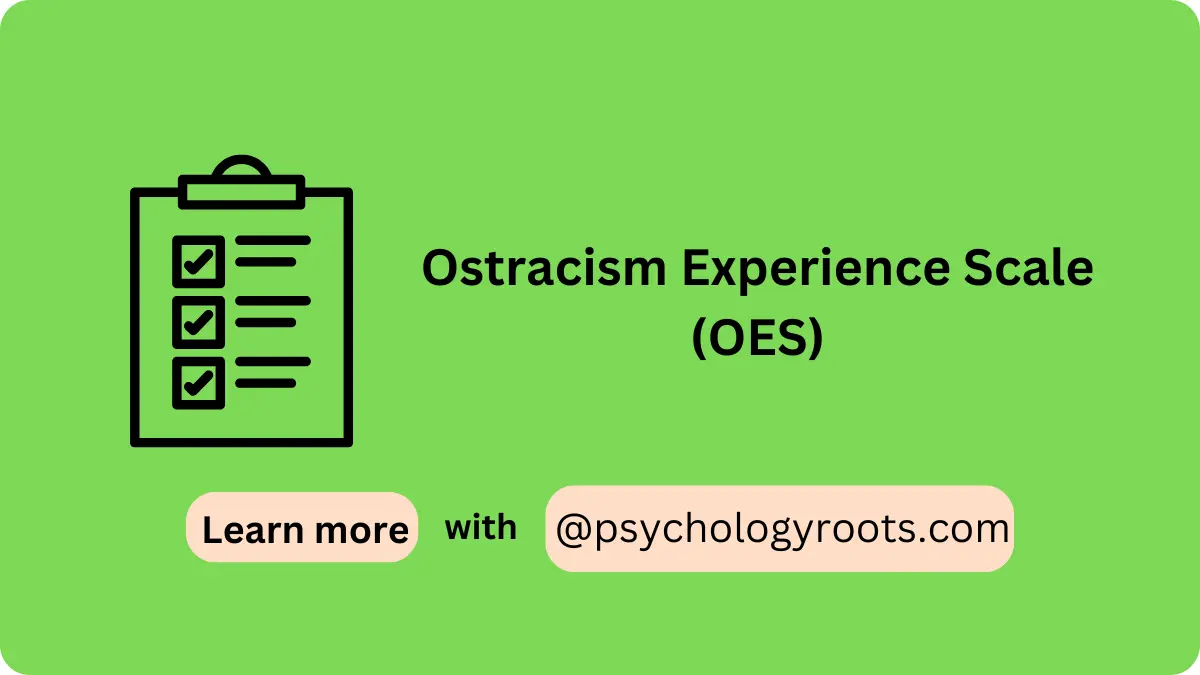Table of Contents
Ostracism Experience Scale (OES)
Here in this post, we are sharing the “Ostracism Experience Scale (OES)”. You can read psychometric and Author information. We have thousands of Scales and questionnaires in our collection (See Scales and Questionnaires). You can demand us any scale and questionnaires related to psychology through our community, and we will provide you with a short time. Keep visiting Psychology Roots.
About Ostracism Experience Scale (OES)
Scale Name
Ostracism Experience Scale (OES)
Author Details
Shahzad, B., Aqeel, M., Naseer, H., Khan, M. A., Fawad, N., & Tahreem, A.
Translation Availability
English

Background/Description
The Ostracism Experience Scale (OES) was developed to assess the experiences of ostracism among young adults, particularly in the Pakistani cultural context. Ostracism, defined as being ignored or excluded, can significantly impact individuals’ psychological and emotional well-being. The OES evaluates the prevalence and intensity of ostracism experiences across various settings, including personal, social, and professional domains.
This tool fills a critical gap in the measurement of ostracism in non-Western populations, addressing cultural nuances and specific societal challenges. It has demonstrated strong psychometric properties, making it a reliable and valid measure for understanding how ostracism affects individuals’ mental health, relationships, and overall functioning.
Administration, Scoring and Interpretation
- Obtain the Scale: Access the Ostracism Experience Scale (OES) from the published source or request permission from the authors.
- Define the Purpose: Clearly communicate the aim of the assessment to participants, ensuring ethical considerations like informed consent and anonymity.
- Provide Instructions: Participants rate their experiences on a Likert scale (e.g., from strongly disagree to strongly agree).
- Emphasize honest and accurate responses.
- Administer the Scale: Suitable for individual or group administration in research, clinical, or educational settings.
- Scoring: Calculate total and subscale scores (if applicable) to evaluate the intensity and domains of ostracism experiences.
Reliability and Validity
- The scale demonstrated excellent internal consistency with a Cronbach’s alpha of .91 in validation studies.
- Established through rigorous psychometric testing, including exploratory and confirmatory factor analyses.
- Strong construct validity demonstrated by correlations with measures of loneliness, depression, and social anxiety.
Available Versions
Multiple-Items
Reference
Shahzad, B., Aqeel, M., Naseer, H., Khan, M. A., Fawad, N., & Tahreem, A. (2022). Psychometric development and validation of ostracism experience scale (OES): across sample of young adults from Pakistan. International Journal of Human Rights in Healthcare, 15(3), 257-275.
Important Link
Scale File:
Frequently Asked Questions
What does the OES measure?
The OES measures the frequency and intensity of ostracism experiences among young adults.
Who can use the OES?
Researchers, clinicians, and educators studying the effects of ostracism on mental health and social interactions.
What is the response format of the OES?
Participants respond on a Likert scale, typically ranging from strongly disagree to strongly agree.
Is the OES culturally specific?
The OES was developed for young adults in Pakistan but may be adapted for use in other cultural contexts.
What are its psychometric properties?
The scale has high reliability (α = .91) and strong construct validity.
Disclaimer
Please note that Psychology Roots does not have the right to grant permission for the use of any psychological scales or assessments listed on its website. To use any scale or assessment, you must obtain permission directly from the author or translator of the tool. Psychology Roots provides information about various tools and their administration procedures, but it is your responsibility to obtain proper permissions before using any scale or assessment. If you need further information about an author’s contact details, please submit a query to the Psychology Roots team.
Help Us Improve This Article
Have you discovered an inaccuracy? We put out great effort to give accurate and scientifically trustworthy information to our readers. Please notify us if you discover any typographical or grammatical errors.
Make a comment. We acknowledge and appreciate your efforts.
Share With Us
If you have any scale or any material related to psychology kindly share it with us at psychologyroots@gmail.com. We help others on behalf of you.